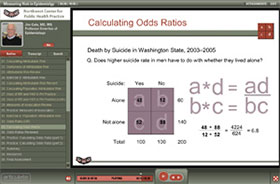Description
A study reports that smokers face a relative risk of dying from lung cancer 24 times higher than non-smokers, and a relative risk of only 1.4 times higher for dying of heart disease. How important are these differences? If you have no idea, then the course Measuring Risk in Epidemiology is for you. The course introduces key measures of risk, shows how they're calculated, and discusses how to interpret them when you encounter them in reports and news stories. This is part of a nine-part series on epidemiology.
Learning Objectives
After completing this course, you will be able to:
- Define risk as it is used in public health practice
- Identify measures of association as they are used in epidemiology
- Interpret relative risk and odds ratios, and be familiar with their calculation using 2x2 tables
- Interpret the following measures of risk differences: attributable risk, population attributable risk, and population attributable risk percent
Intended Audience
Public health professionals who want to increase their familiarity with the basic concepts of epidemiology. It is recommended that people be familiar with material presented in the following modules: What is Epidemiology in Public Health?, Data Interpretation for Public Health Professionals, and Study Types in Epidemiology.
Epidemiology Series
What Is Epidemiology in Public Health?
Data Interpretation for Public Health Professionals
Basic Infectious Disease Concepts in Epidemiology
Introduction to Public Health Surveillance
Introduction to Outbreak Investigation
Measuring Risk in Epidemiology
Cause and Effect in Epidemiology
Screening in Public Health Practice
Format
Web-based, Flash presentation. This online course has an audio narration and interactive exercises. This course should take about one hour to complete.
Course Instructor
James L. Gale, MD, MS
Professor Emeritus of Epidemiology
Northwest Center for Public Health Practice
University of Washington School of Public Health
Technical Requirements
This course requires certain software and browser plugins to be installed. See our Technical Requirements.
Accessibility
This online training course is audio narrated. A print version is available in the Supplemental Material section at the bottom of this page. Please note that the print version does not include interactive exercises, quizzes, or the final assessment. To receive a print version of the quizzes in this course, or if you have any difficulties, please contact nwcphp@uw.edu.
